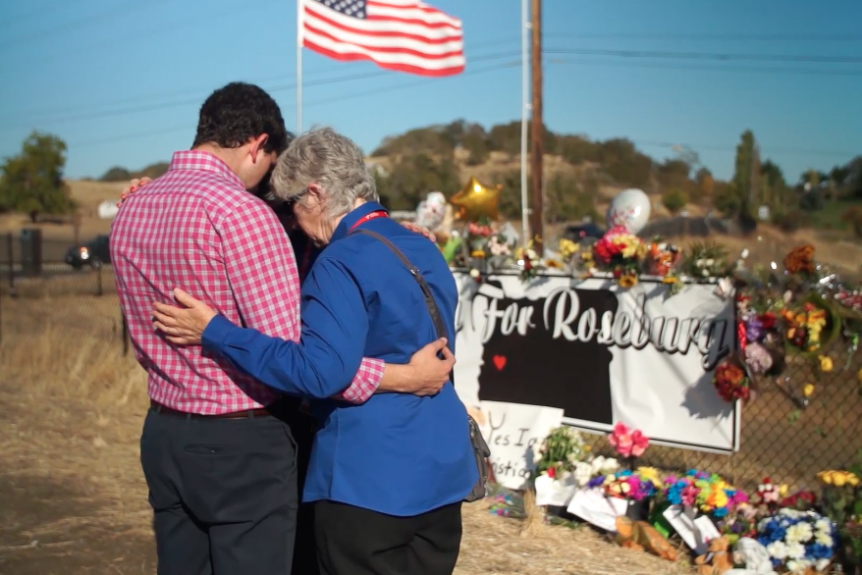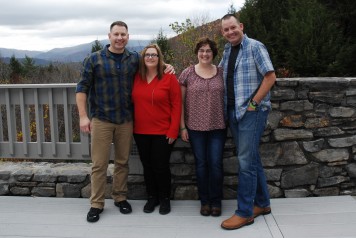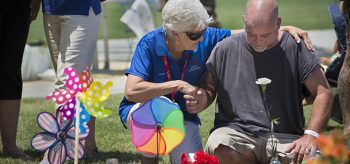
Have I not commanded you? Be strong and courageous. Do not be frightened, and do not be dismayed, for the Lord your God is with you wherever you go. —Joshua 1:9, ESV
“What a weird way to start a training exercise.”
That’s the first thought that crossed Craig Kinney’s mind when a call about an active shooter at Umpqua Community College came across his scanner.
“And then the [radio] traffic kind of went on a little bit, and we realized this is real.”
Craig serves as chief deputy medical examiner for Douglas County Sheriff’s Office in Roseburg, Oregon. Seconds after the call came in, the office emptied out as everyone ran to their vehicles.
“Everybody’s trying to get there as fast as you can,” Craig said, “because you know every second is so important.”
The sheriff’s office is only seven-and-a-half miles from the college, but two Roseburg police detectives were even closer.
Detective Todd Spingath and his boss, Detective Sgt. Joe Kaney, were stopping to grab a cup of coffee when they heard the call and raced toward the college. It was 10:38 a.m. on Oct. 1.
“The closer we were getting, I keep looking at the side mirrors on our truck, and I don’t see lights behind us,” Todd recalled. “I said, ‘I think we’re going to be the first ones there.’”
A Much-Needed Break
Just over a month after the shooting left 10 people dead, both Craig and Todd found themselves more than 2,500 miles from Roseburg.
One by one, they quietly shared their stories during the National Law Enforcement Retreat at the Billy Graham Training Center at The Cove in Asheville, North Carolina.
It was the first time Todd talked publicly about what happened, despite relentless requests from local and national media.
On Thursday, with his wife, Cindy, by his side, he opened up about the events of Oct. 1 and the difficult weeks that followed.

That’s part of what the National Law Enforcement Retreat is about—providing a peaceful place for officers and their spouses to relax, unload their burdens and discuss the unique challenges law enforcement families face every day.
Hosted by the Billy Graham Rapid Response Team—a network of crisis-trained chaplains that deploys in the wake of disaster—the retreat is an annual event that began in 2014.
This year, the Rapid Response Team offered scholarships to three officers and spouses from Roseburg, Oregon. That’s how Todd and Cindy ended up at the retreat, along with Craig and Candi Kinney and one other couple.
“We found out they were opening up scholarship positions for three guys to come out here, and then the local churches came together and said, ‘We want to cover your airfare and your hotel fees,’” Craig said.
“The whole thing has just been blessing on top of blessing. We’ve just felt like honored guests.”
On Wednesday, they joined more than 200 other officers and spouses from across the U.S. and Canada. They all gathered at the mountain retreat center to take a break from life’s stresses, worship God, hike the mountain trails, and learn how to strengthen their families and communities.
For Craig and Candi, the timing couldn’t have been better.
“I was looking forward to getting away,” Candi said. “Because it has been really tough.”
Gunshots on Campus
On Oct. 1, as Craig sped toward Umpqua Community College, he made a quick call to Candi, asking her to pray.
“I remember the drive there, but more than that I remember praying the whole way there,” Craig said. “I was just praying and praying and praying.”
Meanwhile, Todd and his boss, Joe, were pulling into the college.
“Before the car even stopped, we heard the gunshots,” Todd said.
They abandoned their plan to suit up with bulletproof vests as they ran toward the sound of gunfire.
“It was a tactical nightmare, basically,” Todd said. “We couldn’t see a whole lot. We started getting shot at. We actually got hit by debris, so we kind of split. I went to the right, and he went to the left.”
He still couldn’t see the shooter, and learned later that he was likely shooting through a window.
“It just seemed like wherever I moved he totally had me,” Todd said.
He could hear Joe fire back at the shooter before getting a glimpse of a muzzle flash and firing back himself.
“And we see a girl come out, and she was holding her head and she had blood all over her, so I waved her over to me,” Todd said. “She ran over to me, and I asked, ‘Where’s he at? Where’s he at?’”
Moments later, both detectives were running into the classroom.
“Joe and I got there about the same time and could see the carnage of everything, see a bunch of spent casings on the ground, and the person who ultimately was the suspect looked like he had shot himself,” Todd said.
“We could see that people were dead, and we basically just started triaging people at that point.”
Days after the shooting, when word got out about the actions of the two detectives, people were quick to shower Todd with praise—something he continues to reject.
“That guy hates to be called a hero,” Craig said. “His actions and that of his partner that day saved lives, saved a lot of lives. He’s a detective; didn’t have a duty belt, didn’t have a bulletproof vest. They put themselves in harm’s way.”
When asked how much time passed between the initial call and the shooter’s death, Todd answers, “Two-and-a-half years.”
It was four minutes.
Death … and Hope
When the gunfire ceased, Craig’s work began. Tasked with identifying the victims, he was in the midst of the carnage for hours.
“I’ve dealt with horrific deaths,” he said. “I’ve seen death at its ugliest and its saddest, but seeing it on this scale was …”
He couldn’t quite finish the sentence.
After working until 2:30 in the morning, Craig was back at the scene just a few hours later for another long day. That’s when he remembers seeing the Billy Graham Rapid Response Team’s Mobile Ministry Center in the parking lot.
“I was amazed at how fast they were there,” he said. “We were like, ‘Where did this come from?’
“It was right by the front gates with a crowd of people around, and I thought, that is so cool to have it there so fast, and it was obvious that people were using it. And I’ve heard stories of people who received Christ.”
The truck had been in California, near the wildfires that broke out in September. Members of the Rapid Response Team drove through the night to get it to Roseburg the morning after the shooting.
In the days that followed, a team of crisis-trained chaplains was on site to offer hope in the midst of darkness and to minister to the community, including first responders.
During the two-week deployment, nine chaplains prayed with 340 people and had conversations with many more.
Some of the same chaplains were present at the National Law Enforcement Retreat, offering prayer and a listening ear to attendees.
They’re Not Alone
Three days after the Roseburg shooting, Craig paused to process what had happened.
“I went back to Snyder Hall, and I just stood there on the sidewalk looking at it,” he said. “That’s the first time I remember really crying, and I remember praying again there.”
He says his faith in Christ shapes his view of life and death. Knowing Jesus—and the reality of eternal life for those who follow Him—has allowed Craig to cope with the death he sees so often on the job.
But that doesn’t mean it’s easy. Both he and Todd said it helped them to meet so many like-minded officers at the retreat—men and women who can relate to one another in a way outsiders can’t.
“Honestly, I wouldn’t have come had it not been a law enforcement-based deal,” Todd said. “I’m not a social butterfly. But when you’re around a bunch of your brother and sister officers, it’s a lot easier.”
It’s also confirmation that, whatever these officers may be going through, they are not alone.
“To look across the room and see a-hundred-and-some officers,” Craig said, “big, tough, strong cops, standing with hands in the air, worshiping Jesus—it was powerful.”
Have hope even in the midst of tragedy. Invite Jesus into your life.
Read about others who attended the Law Enforcement Retreat, including one police officer and his wife impacted by the chaos in Baltimore earlier this year.


